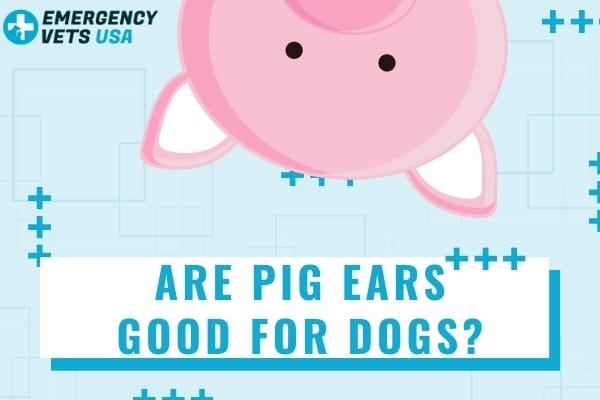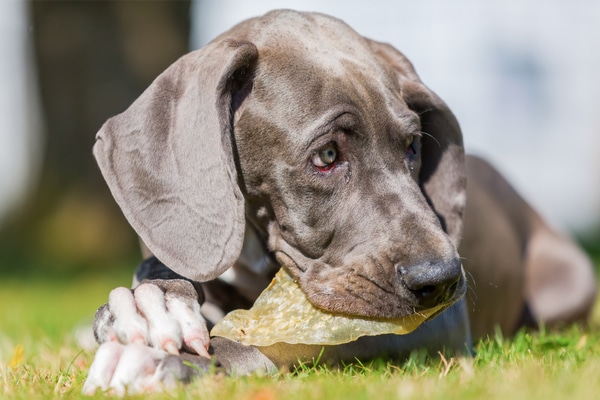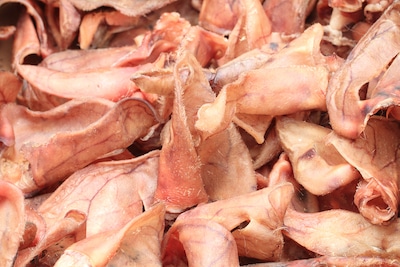Should You Feed Your Dog Pig Ears?
When looking for an affordable chew toy that satisfies your dog’s need to crunch, pig ears can be the perfect solution.
This tasty treat can not only offer your pup a chewing outlet, but most pups absolutely love the flavor. This tasty snack can provide positive enrichment for so many furry friends, but there are a few safety tips to keep in mind.
To help you better understand whether or not this is the best treat for your dog, let’s discuss a few pros and cons to help you make an educated decision for your pup.

Pros Of Pig Ears For Dogs
Pig ears have been used by dog owners, breeders, and handlers for as long as we can remember. Dogs often beg for this convenient and delicious treat, making it a favorite among so many canine companions.
To help you fully understand the positives of this treat, let’s discuss some of the pros of pig ears below.
Clean Teeth
Dogs rely on chewing to clean their teeth and remove debris, plaque, and tartar. Pig ears offer a medium strength chew that breaks into fibers, helping to destroy any harmful buildup in its tracks.
These fibers can act like dental floss for your dog, sliding between the teeth and cleaning from all angles. Pig ears can provide hours of entertainment for a bored pup, doubling as a basic tooth brushing.
The more time a dog spends on a treat, the more teeth-cleaning benefits they get for the amount of chew they consume.
Low-Cost Treat
If your dog chews a lot, you may find that providing sufficient chew toys to keep them satisfied gets expensive. Pig ears are not only affordable, but can be stored for fairly long periods when purchased in bulk.
For dogs that need lots of chew toys or households with lots of dogs, the low cost of pig ears can be very attractive.
Dogs Love Them
Pig ears have a delicious flavor that dogs cannot stay away from. Their smell pulls in so many furry friends, causing our pup to get hooked from the moment they taste their first pig ear.
While pig ears shouldn’t be a staple in your dog’s diet, it can be the perfect occasional treat.

Can Be Safe With Proper Monitoring
Dogs love chewing on pig ears because they have such an enticing texture. While the pig ear fibers and unique consistency make for the perfect snack, they do require proper monitoring to make sure your pup doesn’t struggle to swallow any pieces as they break off.
As long as you are willing to keep an eye on your pup each time it’s time for a pig ear snack, most strong chewers will do just fine.
Pig ears also soften as they are chewed, helping to make for an easier snacking experiencing by the time your pup breaks off a piece.
As long as your dog does not scarf down the entire pig ear at once, they should be able to chew the softened pieces with ease.
Cons Of Pig Ears For Dogs
Unfortunately, pig ears have come into media attention for the wrong reasons far too often.
Pig ears have been connected to salmonella, GI upset, and even life-threatening intestinal obstructions. Pig ears have the potential to be enjoyed safely by dogs, but they do come with their own set of risks.
To help you better determine if this is the right treat for your dog, let’s discuss some of the potential cons of pig ears for dogs.
Pig Ears Are Not Very Healthy

Pig ears are high in fat, which is likely why so many pups love them. Treats that are high in fat and sodium may be a favorite among many canine friends, but they are not necessarily good for them.
Pig ears contribute significantly to your dog’s daily calorie intake, without offering a lot of helpful nutrients.
If your dog chews very slowly, or if you take pig ears away before they are fully consumed, the fat content may be less of a concern. But if pig ears are a go-to snack for your pup, the fat and calorie intake can lead to complications down the line.
They Can Cause Digestive Issues
Pig ears are not always easily digestible. There is no way to know if your dog is chewing the pig ear adequately, meaning there is no way to control the size of the pieces they swallow.
The larger the pieces they consume, the harder it is for your dog to digest it properly.
Pieces can become lodged in your dog’s throat or elsewhere in the digestive tract, leading to serious complications to follow.
Ranging from severe GI upset to intestinal perforations, nothing good can come of attempting to swallow large pig ear pieces.
Some dogs may be able to chew the pig ear and break off pieces safely, but they still may struggle with issues like diarrhea or vomiting.
A diet high in pig ears can eventually result in chronic digestive problems due to the high-fat content or difficult-to-digest material.
They Can Be Infected With Bacteria Or Salmonella
If your dog takes a long time to eat a pig ear, bacteria may be prone to developing on the moist, fatty material of the pig ear. Due to this, it is important never to leave pig ears out if your dog is not currently chewing on them.
Pig ears have also been found to be infected with bacteria like salmonella and other harmful invaders, all of which can lead to serious illness for the furry friend chewing them.
Not only can your dog become extremely ill, but so can the humans in your home if they are exposed as well.
Tragically, children were infected with salmonella across Canada as a result of pet dog pig ear treats.
Ongoing research indicates that pig ears remain a source of salmonella infection, even though we have known about the threat since 1999 (source).
Choosing responsibly sourced brands is a way to avoid bacteria or salmonella poisoning, but it is still a possibility.
Think Carefully About Pig Ears
Pig ears have been offered to dogs for many years, but we always suggest making your own decision based on the information we discussed above.
If you aren’t sure how you feel about pig ears, you can always speak to your veterinarian about their treats of choice as well.

My name is Amber. I am a dedicated animal lover that turned my passion into my career. I am a Licensed Vet Tech with 12 years of experience in veterinary medicine, but I recently took my career online to help spread accurate information on animal care. With how vast the online world is, I have a strong desire to ensure that the reader always walks away with helpful pet advice. With the experience I’ve gained from my time in this field, I have been able to travel the world, offering my services to as many animal rescues as I can find. If I am not at my laptop, or back home visiting family, you can find me somewhere in the world, cuddling every furry friend that I can find! More About Us
